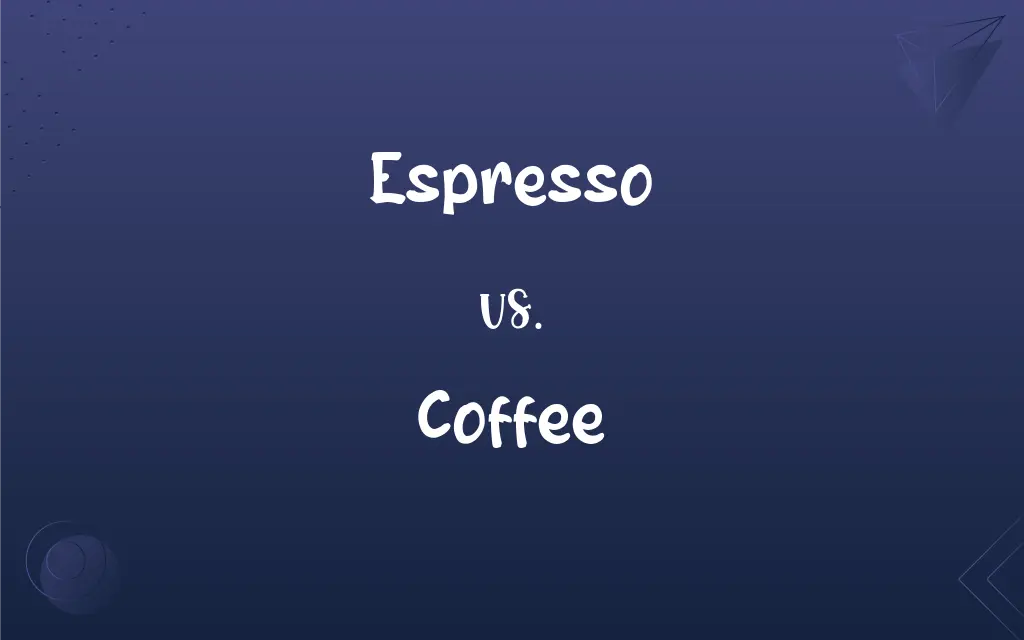Espresso vs. Coffee: What's the Difference?
Edited by Aimie Carlson || By Harlon Moss || Updated on October 25, 2023
Espresso is a concentrated coffee brew, while coffee is a general term for drinks made from roasted coffee beans.

Key Differences
Espresso and coffee are both beloved drinks made from roasted coffee beans, yet they are distinct in preparation and characteristics. Espresso is made by forcing hot water under high pressure through finely-ground coffee beans. This method produces a rich, concentrated coffee shot, typically served in small amounts. On the other hand, coffee, in its traditional form, is brewed by pouring hot water over coarser grounds, allowing it to seep and extract flavors over time.
Espresso is known for its robust flavor and thicker consistency. Its method of preparation results in a creamy layer on top, called the crema. Coffee, depending on its preparation method, can vary from light to full-bodied but is generally less concentrated than espresso. While espresso shots are the foundation for various coffee drinks, like lattes or cappuccinos, coffee is often enjoyed black or with additions like cream or sugar.
In terms of equipment, preparing espresso typically requires a specialized machine that can generate the necessary pressure. Coffee can be made with a variety of devices, including drip machines, French presses, or pour-over setups. The grind size for the beans also differs; espresso requires a fine grind, whereas most coffee brewing methods use a medium to coarse grind.
Culture and tradition have played roles in distinguishing espresso and coffee. Espresso has roots in Italian culture, with cafes serving it alongside social interactions. Coffee, with its broader definition, has various traditions worldwide, from the American morning cup to Swedish "fika" breaks.
Comparison Chart
Brewing Method
Forced hot water under high pressure
Varies (e.g., drip, pour-over, French press)
ADVERTISEMENT
Concentration
Highly concentrated
Less concentrated
Typical Serving Size
Small (1-2 ounces)
Larger (6-12 ounces or more)
Grind Size
Fine
Medium to coarse
Cultural Origins
Italian
Global
Espresso and Coffee Definitions
Espresso
A concentrated coffee shot.
She ordered a double espresso for a caffeine boost.
ADVERTISEMENT
Coffee
Often served black or with additives.
She liked her coffee with cream and sugar.
Espresso
Basis for many coffee beverages.
He used espresso to create a creamy latte.
Coffee
Can be brewed using various methods.
His preferred method for making coffee was the French press.
Espresso
Known for its creamy top layer.
The espresso had a perfect crema on top.
Coffee
Contains caffeine, a natural stimulant.
He drank coffee to stay awake during long meetings.
Espresso
Typically served in small quantities.
After dinner, they enjoyed a shot of espresso.
Coffee
A drink made from roasted coffee beans.
She started her day with a cup of coffee.
Espresso
Coffee made by forcing water under pressure.
The barista prepared the espresso with precision.
Coffee
Culturally significant in many societies.
They met for coffee every Sunday afternoon.
Espresso
A strong coffee brewed by forcing hot water under pressure through darkly roasted, finely ground coffee beans.
Coffee
Any of various tropical African shrubs or trees of the genus Coffea, especially C. arabica or C. canephora, widely cultivated in the tropics for their seeds that are dried, roasted, and ground to prepare a stimulating aromatic drink.
FAQs
What's the crema in espresso?
Crema is the creamy top layer on an espresso shot, resulting from the brewing process.
How is coffee typically brewed?
Coffee can be brewed using various methods, such as drip, pour-over, or French press.
Can espresso be used to make other drinks?
Yes, espresso is the foundation for drinks like lattes, cappuccinos, and more.
What is espresso?
Espresso is a concentrated coffee made by forcing hot water through finely-ground beans.
What is the cultural significance of espresso?
Espresso is deeply rooted in Italian culture, often consumed in cafes as part of social rituals.
Which has more caffeine: espresso or coffee?
Ounce for ounce, espresso contains more caffeine, but people generally consume larger quantities of coffee.
Can you make espresso from regular coffee?
The result won't be true espresso but can resemble its strength if made concentrated.
What determines the flavor of coffee?
Factors include bean origin, roast level, brewing method, and any additives.
How do roasts affect coffee flavor?
Light roasts retain more original bean flavors, while dark roasts yield a more robust, charred taste.
Why do some people add milk to espresso?
Milk softens the strong flavor of espresso, and the combination results in drinks like lattes or cappuccinos.
Do all coffee beans have caffeine?
Most do, but there are decaffeinated beans that undergo a process to remove most of the caffeine.
How much coffee is in a regular cup compared to espresso?
A regular coffee cup can range from 6-12 ounces or more, while espresso is typically 1-2 ounces.
Why is espresso grind size finer than coffee?
A fine grind allows for quicker extraction under high pressure, which is essential for espresso.
Can I make espresso without an espresso machine?
While specialized machines produce the best espresso, methods like AeroPress can mimic espresso's strength.
How long does it take to brew espresso compared to coffee?
Espresso brews in about 25-30 seconds under pressure, while coffee brew times vary by method.
Why is espresso often more expensive at cafes?
The equipment, skill, and quality of beans can make espresso preparation more costly.
Is there a difference between coffee beans and espresso beans?
Both come from the same plant, but "espresso beans" are often roasted darker for a bolder flavor.
How should I store my coffee beans?
Store in an airtight container in a cool, dark place to preserve freshness.
How is espresso's strength measured?
Espresso's strength is often gauged by its concentration and depth of flavors.
Can you make coffee with espresso beans?
Yes, but the result will be bolder and stronger than using regular coffee beans.
About Author
Written by
Harlon MossHarlon is a seasoned quality moderator and accomplished content writer for Difference Wiki. An alumnus of the prestigious University of California, he earned his degree in Computer Science. Leveraging his academic background, Harlon brings a meticulous and informed perspective to his work, ensuring content accuracy and excellence.
Edited by
Aimie CarlsonAimie Carlson, holding a master's degree in English literature, is a fervent English language enthusiast. She lends her writing talents to Difference Wiki, a prominent website that specializes in comparisons, offering readers insightful analyses that both captivate and inform.































































